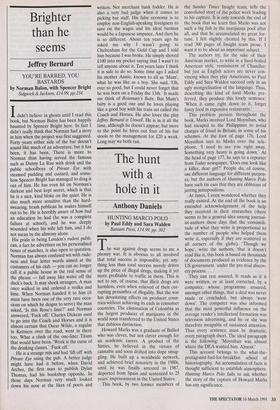The hunt with a hole in it
Anthony Daniels
HUNTING MARCO POLO by Paul Eddy and Sara Walden Bantam Press, £14.99, pp. 302 The war against drugs seems to me a phoney war. It is obvious to all involved that total success is impossible; yet any- thing less than total success merely drives up the price of illegal drugs, making it yet more profitable to traffic in them. This is not to say, of course, that illicit drugs are harmless, even when relieved of their cor- rupting penumbra of illegality. But the war has devastating effects on producer coun- tries without achieving its ends in consumer countries. The elimination of Colombia as the largest producer of marijuana in the world soon transferred to the United States that dubious distinction.
Howard Marks was a graduate of Balliol who was clever, but not clever enough for an academic career. A product of the Sixties, he believed in the virtues of cannabis and soon drifted into dope smug- gling. He built up a worldwide network, and achieved brief notoriety in the 1980s, until he was finally arrested in 1987, deported from Spain and sentenced to 25 years' imprisonment in the United States.
This book, by two former members of
the Sunday Times Insight team, tells the convoluted story of the police work leading to his capture. It is only towards the end of the book that we learn that Marks was not such a big fish in the marijuana pool after all, and that he accumulated no great for- tune. I felt slightly cheated by this. If I read 300 pages of Insight team prose, I want it to be about an important subject.
The authors try, for the sake of their American market, to write in a hard-boiled American style, reminiscent of Chandler; but just as English actors are never con- vincing when they play Americans, so Paul Eddy and Sara Walden succeed only in an ugly mongrelisation of the language. Thus, describing the kind of food Marks pre- ferred, they produce this lovely sentence: 'When it came right down to it, forget fancy food in expensive restaurants.'
This problem persists throughout the book. Marks involved Lord Moynihan, who had escaped to the Philippines to avoid charges of fraud in Britain, in some of his schemes. At the foot of page 176, Lord Moynihan says to Marks over the tele- phone, 'I need to see you right away. Something very heavy is going down.' At the head of page 177, he says to a reporter from Today newspaper, 'Does one look like a killer, dear girl?' People do, of course, use different language for different purpos- es; but the authors of Hunting Marco Polo have such tin ears that they are oblivious of jarring juxtapositions.
At times, I even wondered whether they really existed. At the end of the book is an extended acknowledgement of the help they received in their researches (there seems to be a general idea among journal- ist-authors these days that the verisimili- tude of what they write is proportional to the number of people who helped them write it, especially if they are scattered in all corners of the globe). 'Though we hope', write the authors, 'that it doesn't read like it, this book is based on thousands of documents produced as evidence by the US government under the pre-trial discov- ery process. . .
They can rest assured. It reads as if it were written, or at least corrected, by a computer, whose programme ensured, amongst other things, that a deal was never made or concluded, but always 'went down'. The computer was also informed that the most powerful influence on the average reader's intellectual formation was television advertising, and he or she was therefore incapable of sustained attention. Thus every sentence must be dramatic, every paragraph short. The ideal paragraph is the following: 'Moynihan was almost where the DEA wanted him. Almost.'
This account belongs to the what-the- protagonist-had-for-breakfast school of historiography. An accumulation of facts is thought sufficient to establish atmosphere. Hunting Marco Polo fails to ask whether the story of the capture of Howard Marks has any significance.


























































 Previous page
Previous page